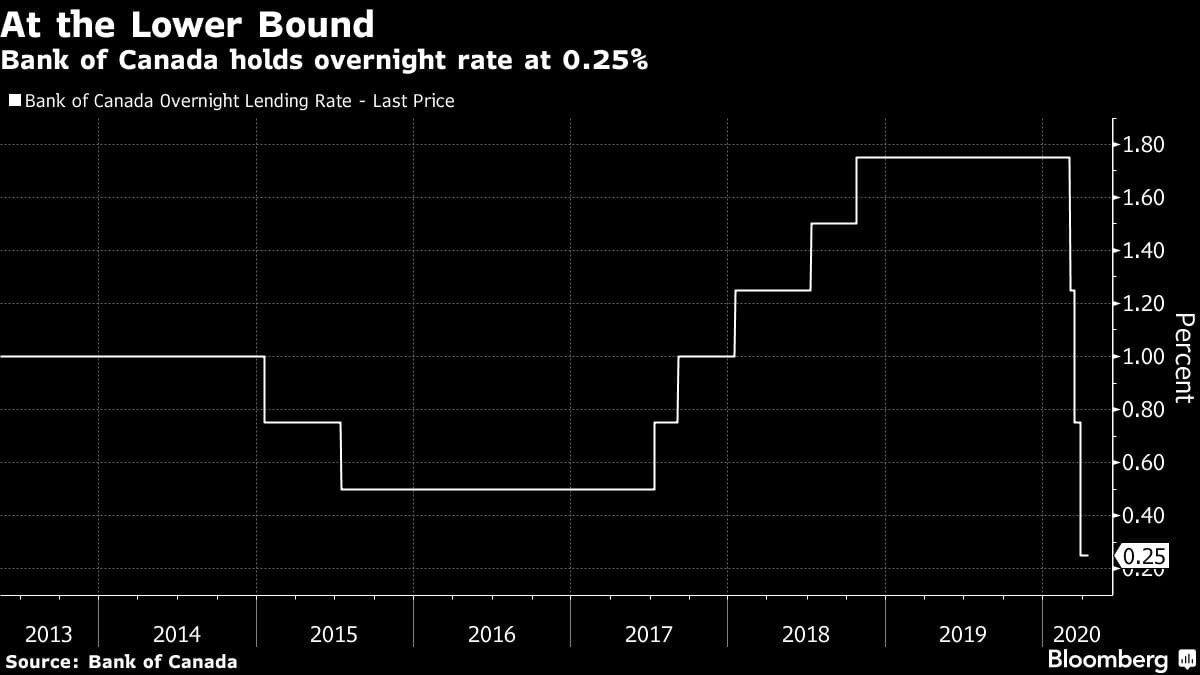
(Bloomberg) -- Tiff Macklem returns to Ottawa next month to take the helm at the Bank of Canada, and while he’ll be busy greeting old colleagues he hasn’t seen for six years, his focus will quickly shift to leading the country out of its sharpest recession in nine decades.
Macklem, who was tapped Friday to replace Stephen Poloz on June 3, is taking over at an extraordinary time. The central bank is plowing ahead with its first-ever large scale asset purchase program to keep financial markets functioning, after cutting the benchmark interest rate to a record low 0.25%, the so-called effective lower bound. That may be just the beginning.
“We are going to be moving from damage control in the financial system and easing strains there, to try to stimulate a recovery,” Canadian Imperial Bank of Commerce economist Royce Mendes said by phone. “And that’s going to need a more aggressive policy response. I think he’s going to have to do things like standard QE.”
This isn’t Macklem’s first rodeo. He has more than two decades of experience at the central bank, and after a stint at the finance department during the 2008-09 financial crisis, he returned in 2010 to become senior deputy governor under Mark Carney. That was about a year after Carney, to reassure markets, issued forward guidance that interest rates would remain low until the economy recovered.
It’s an idea that should be revisited, according Derek Holt, an economist at Bank of Nova Scotia. “If I were Macklem, then on Day 1 I would reintroduce the conditional commitment that was used in 2009,” Holt said by email. Such a move would address the need “to offer something in a highly uncertain world.”
While the current public health crisis is very different from the financial crisis, Macklem will get the opportunity to use tools that were discussed merely as theoretical constructs during his time at the bank.
2nd Crisis
“He is the full package. He’s got the academic credentials, the experience in the private sector, central bank and business and is well-respected in a policy role,” Royal Bank of Canada Chief Economist Craig Wright by phone. “Nobody outside of Canada would be surprised to hear his name as governor.”
Senior Deputy Governor Carolyn Wilkins had been the frontrunner to succeed Poloz, but Macklem’s appointment wasn’t a complete surprise, according to Toronto-Dominion Bank Chief Economist Beata Caranci. For the past two decades, the government has chosen a governor from outside the bank.
Macklem is both an insider and outsider, having worked outside of the bank while also having a legacy working under Carney. “It looks like they want that balance between the two,” Caranci said, adding the 58-year-old is familiar with adversity. “We are in an equally, if not more, challenging period now with the degree of uncertainty. This is not unfamiliar territory for him.”
In the near-term, Macklem’s accession to governor probably won’t mark a major divergence from current monetary policy. He declined to give specifics until he’s actually in the governor’s seat, but said he agrees with Poloz that rates are at a floor.
“When you look at the current situation, yes I’m quite comfortable with the effective lower bound where it is,” the incoming governor said Friday at a press conference, suggesting it wouldn’t make sense to add to the uncertainty with negative interest rates.
He may also be less inclined to factor the currency into policy decisions than Poloz was, according to Bank of Montreal Chief Economist Doug Porter, a former classmate of the incoming governor. “It’s probably fair to say that Macklem will be less focused on the Canadian dollar than Poloz, although that does not imply he will be less dovish,” Porter said in a note.
When the time does come for Macklem to enact a recovery plan, the bank still has a few options left in the toolkit. He could, for instance, implement forward guidance, standard quantitative easing or more targeted credit easing to make sure the public benefits from the effects of lower interest rates.
For now though, the Montreal native endorsed the idea that unusual circumstances call for exceptional policy measures. “You need to think beyond the normal responses,” he said, echoing Poloz.
“You need to restore confidence and I think when you look at what the Bank of Canada has done so far, when you look at the actions that the government of Canada has taken to provide a bridge to Canadians to the other side of this, these are bold unconventional policy responses that really have embraced this idea,” Macklem said.
For more articles like this, please visit us at bloomberg.com
©2020 Bloomberg L.P.